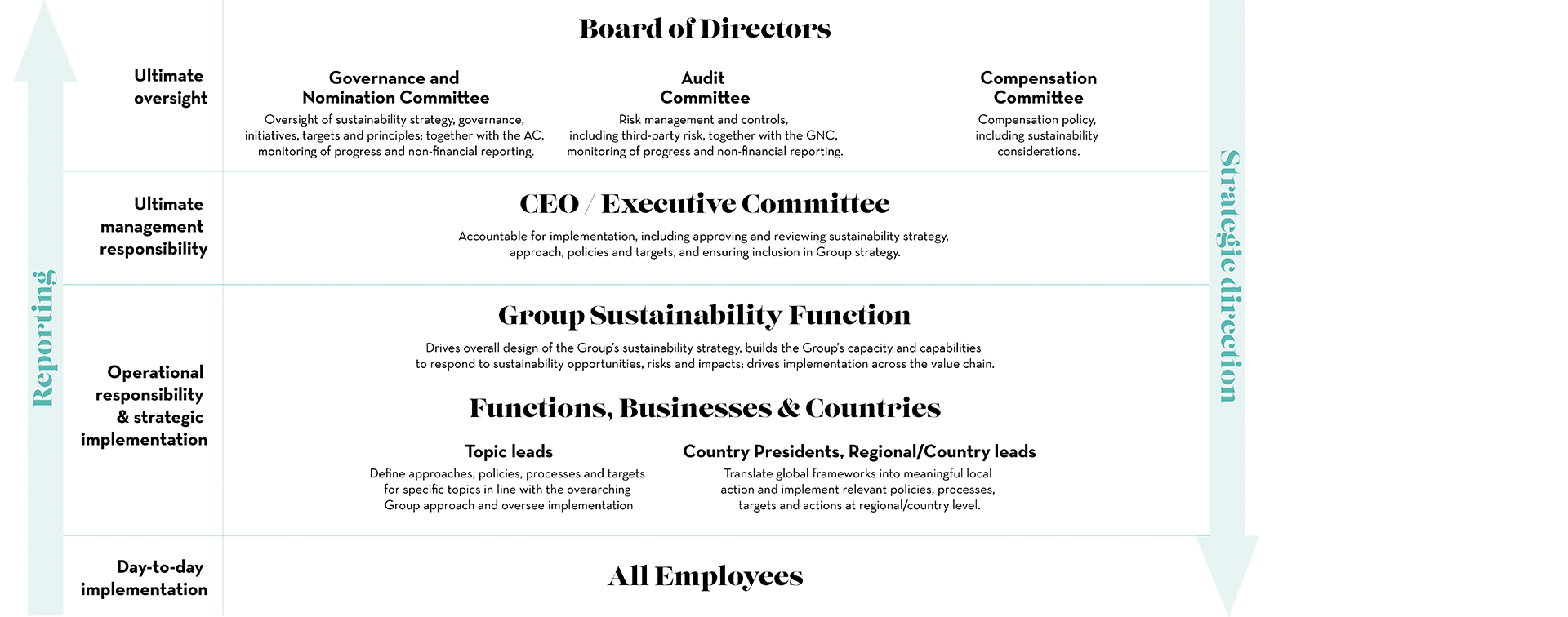We are serious about our ambition and hold ourselves accountable for our progress towards our goals and commitments. Creating meaningful governance structures and the enabling environment within The Adecco Group ensures that we deliver on our promises, stay on top of risks, and capitalise on the opportunities of making our organisation truly sustainable.
Our approach to sustainable business conduct is an integral part of our Future@Work strategy. Sustainability for us is not a one-off effort or something that sits separate from the business. It is an integral part of how we do business. We can only be successful as an organisation if we are mindful of the broader impact of our activities and consistently embed material environmental, social and governance (ESG) considerations into all that we do.
Our Sustainability governance

-
The Governance and Nomination Committee (GNC) assists the Board in its overall responsibilities as they relate to ESG, oversees the Group’s initiatives, and reviews the principles related to ESG and the reporting on its efforts.
-
The Audit Committee (AC) oversees the Group’s ESG risk management and jointly with the GNC reviews the Group’s progress against ESG targets.
-
The Compensation Committee provides recommendations to the Board regarding the general compensation policy of the Company, including plan details pertaining to ESG considerations.
The Group Executive Committee approves and review.s the Group’s ESG/sustainability approach, policies and targets, ensures embedding in the Group strategy, and is accountable for the implementation across the Group’s business units and functions.
The Group Sustainability function develops the strategic sustainability direction for the Group together with key stakeholders; it is responsible for driving and coordinating efforts, ensuring alignment across the Group, engaging with stakeholders, and reporting on progress. The global head of the function regularly reports to the Board of Directors and the Group Executive Committee.
But for any truly integrated approach, this must be a collaborative effort, with both top down and bottom up input. We want to ensure our activities are meaningful and appropriate to the relevant context, needs and perspectives. Global topic leads are responsible for defining topic approaches, policies, processes and targets in line with the Group framework and rolling them out through the functions, across the business units and into the countries. Regional/country leads then translate the global frameworks into meaningful local action and implement relevant policies, processes, targets and actions at regional/country level.
Embedding Sustainability throughout our business is not simply the responsibility of select leaders, functions, or committees. How we conduct our business comes down to the decisions and actions that each of our colleagues takes, day to day. We are thus also seeking to continuously increase the awareness and understanding among our colleagues of our approach to sustainable business conduct and the role they can play in helping to drive progress.
Do you want to help us make the future work for everyone? Take a look at the opportunities available at the Adecco Group here.
Sustainability in the Group’s compensation framework
For more information, please see the Remuneration Report within the latest Adecco Group Annual Report.
Sustainability in enterprise risk management
The process is conducted on a regular basis, steered by Group management, and overseen and approved by the Board of Directors. Country and business line management teams are involved as well as Group management and corporate functions to ensure consistency and comprehensive coverage by leveraging the expertise of the people in the organisation close to the risks. This is consolidated through an unbiased and honest view on risks that can have a significant impact on their operations and their ability to meet objectives. Where needed, action plans are developed, and progress is reviewed during regular business meetings.
For more information on our risk management approach and principal risks, please see our latest Adecco Group Annual Report.
Stakeholder engagement
Key stakeholders include our colleagues, candidates and associates, clients, shareholders, suppliers, authorities, trade unions, institutional and policy stakeholders, and civil society. Engagement may happen for example through direct interactions and dialogue such as stakeholder panels, through associations, standardised surveys such as Client, Candidate and Associate Net Promoter Score® (NPS®) or Peakon employee engagement surveys, or through broader research projects such as the Global Workforce of the Future report .
For more information on our engagement with institutional stakeholders and policymakers, visit the Public Affairs and Cooperations.
Policies, Standards and Guidelines
Our policies, standards and guidelines are a key element of our approach to responsible business conduct. They define how we want to do our business, and what we expect of ourselves and our business partners throughout the world. They are updated on a regular basis to ensure continued alignment with evolving legislation, regulation, best practices and expectations.
The following provides access to our publicly available documents. These are complemented by many more internal policies, guidelines, and documents e.g. in the area of human resources, data security and privacy, compliance including anti-bribery and corruption, finance and accounting, tax, procurement, or IT.
Human and Labour Rights Policy
Human and Labour Rights Position Statement
